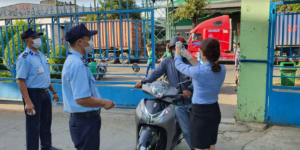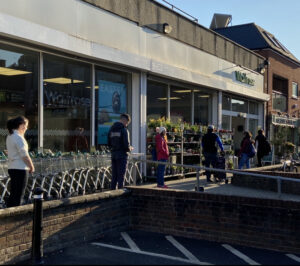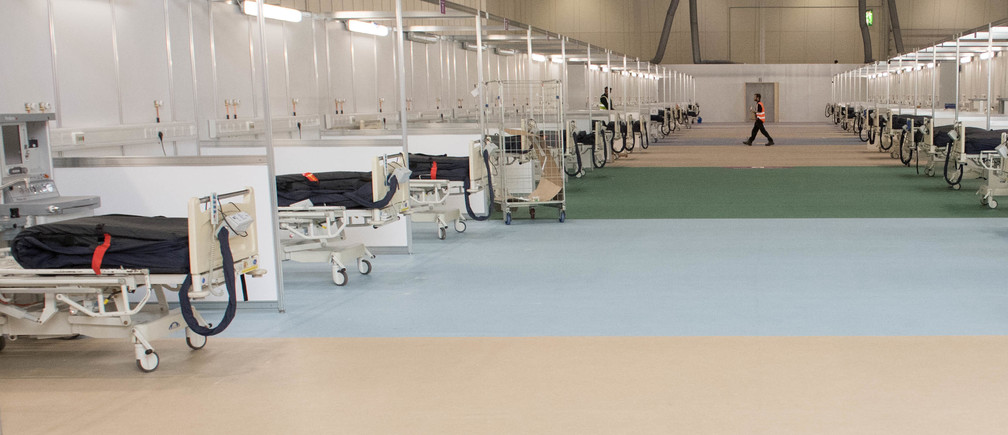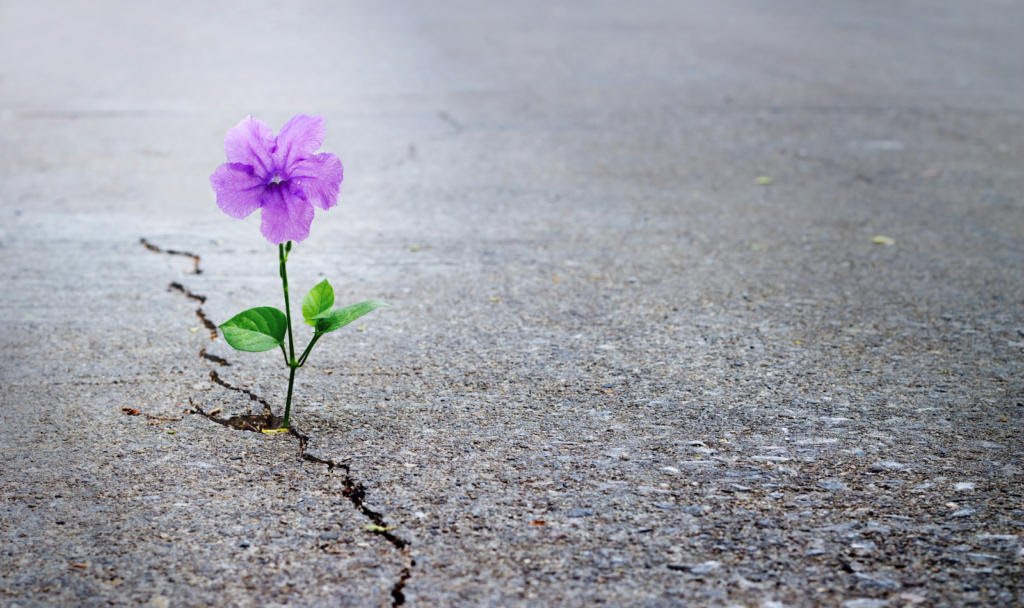By Tran Vu Ngan Giang (Giang Tran), Chevening Scholar, MSc Student, International Management & International Relations, Oxford Brookes University –
We are living in a historically significant time of the 21st century when almost all countries around the world are simultaneously ‘at war’ with the Covid19 pandemic and its impact. Every day, we hear of the exponential rise of infections and the ever-increasing death toll, the potential crash of the stock market, the strain and disruption of supply chains, a rise in unemployment, and that the vulnerable in society are being put into more vulnerable situations, and so on. But what has this pandemic been teaching us about compassion, morality, and ethical business?
In such turbulent times of change, more than ever, we have seen all sectors – public, private, civil society, and individuals – getting together, working with each other to tackle the challenge that this virus presents.
Businesses, both on a big and a small scale around the world, have been actively attempting to balance their responsibility that aims to please their shareholders’ interests with the needs of their employees, clients, and society.
This pandemic is beginning to show us that the role of business in our communities must go beyond the traditional logic of profit maximisation. Let’s take a look at some case studies, in Vietnam as well as my current ‘home country’ due to my studies the UK, that serve to highlight some of the solutions that businesses in Vietnam, as well as and some other countries, have been implementing in response to the emergency at hand:
Balancing the Interests of Stakeholders
Solely focusing on the interests of investors is no longer a way forward to make a company standing out, especially through this global crisis. We are now functioning in a ‘flat world’ with technology that enables information about businesses and their behaviour to be spread quickly, and widely, even faster than the speed of a virus.
Viral shares on social media are now commonplace, and information about the conduct of employers and service providers is now equally likely to become viral online as a commercial or product placement advert. The relationships between business and society, and business and the environment can easily be scrutinised by the public.
In the midst of this global crisis, Corporate Social Responsibility (CSR) is proving to be more important than ever at telling the stories of businesses creatively and in an agile way. ‘Doing the right things’ in responding to public concerns, is more vital now than ever before.
Case 1: Saigon Food (Retail)

Checking employee’s temperature at Saigon Food Image: Seafoodnews.com
Saigon Food, a local company producing processed food for the domestic market as well as the Japanese market, has committed not to increase their prices, despite the rocketing market demand from consumers (Market Insider, 2020). Right from the early days, in January, when the number of coronavirus infections in Vietnam were very few, the company already set up a committee to steer the company’s strategies in preventing the infection. The company has offered additional precautions to all of their 2,500 employees, which include: checking temperature, equipping hand sanitisers in public areas, and requesting their employees to wash their hands, guiding the employees to self-supplement vitamins and providing free lemonade at lunch time, arranging separate trays and utensils for each individual at the company’s cafeteria, and communicating on the precautions that may be needed to defend against the disease (Market Insider, 2020).
Case 2: PNJ (Jewellery)

Face mask with caring and inspiring messages from PNJ to their customers
Phu Nhuan Jewelry JSC (PNJ) is another pioneering example of companies in the Vietnamese domestic market prioritising their employee and customer needs. Similar to Saigon Food, a Covid19 prevention committee has also been in place at PNJ to guide the company through the challenge of battling against the disease to ensure sustainable development afterward. PNJ has also been creatively and quickly updating their communications messages, and promoting their customer service with free home delivery and giving 100,000 face masks for their customers (PNJ, 2020). In addition, their top management constantly communicates the possible impact of the pandemic to their business, and motivates their employees to stay calm and safe, and be effective during this challenging time (PNJ, 2020).
Case 3: GK Group and Others (Tourism, Supermarket, and others)
Smaller companies such as Gia Khang group, for instance, who is an investor of Pandanus resort in Mui Ne, have offered 2 million VND per employee per month for three months to cover their basic living costs (during a time when normal employment has ceased). They said that although their business has been hit hard, they would not be in hunger; but for many of their employees, having no job means having no food on the tables.
Sitting in the UK
Sitting writing this, I have just received some other weekly (twice a week) emails updating me regarding the situation from supermarkets in the UK, banks in Vietnam, airlines, railways, and transportation companies in other countries updating me regarding the actions that they have been taking in order to protect their customers and employees through this time.

A two-meter distance queuing at a supermarket in Oxford, UK.
Simple things that can change the behaviour of customers in the UK to reduce the spread of the virus, such as ‘one-in, one-out’ system with a mark of two-meter distance queuing, a one-way aisles system, disinfection, and protective screen at check-out tills, etc. at the supermarkets have been implemented.
During the first days of the outbreak, when photos on social media showed the elderly in front of empty shelves in the supermarkets, or when a healthcare worker was reported (by BBC radio) crying as food ran out after her shift, caused supermarkets to immediately adjust their operation hours with priority slots for healthcare workers and the elderly, as well as limiting the items bought by each customer. Tens of thousands people in self-isolation or vulnerable groups have been contacted and prioritised for home delivery of groceries.

Protective screen at check-out tills at a pharmacy in Oxford, UK.
In Britain, while employees in many industries are affected, tens of thousands of temporary jobs in supermarkets, retailers, healthcare, digital and technology, and university and research have been open to ease the financial pressure on individuals and impact on the economy. 10% bonus for in-store staff, 15% discounts for all employees, full salary cover for up to 12 weeks for vulnerable employees or employees in self-isolation are some initiatives taken by some supermarkets. Some small pubs and restaurants pay from their own pocket to furlough their employees while applying for the government’s furlough scheme, which is not available until July.
BT, a British multinational telecommunications company, has also frozen their managers’ salaries while offering 1.5% salary rise for 58,000 of their frontline workers (Knapman, H., 2020). While the tourism, and transportation industries have been hit hard, many companies, including low-cost airlines have offered full refund or free rescheduling for their customers.
Beyond One-Off Charitable Giving
All around the world, state governments have been calling for contributions from the non-state actors from individuals to corporates. High Net Worth Individuals are making significant amount of donations by e.g. re-adjusting their salary for a certain amount of time.
Resources from the private sector are enormous and not only in the form of cash donations. Google and Apple are now joining their hand to develop a ‘contact tracing’ app as a strategy offered to get our world safely out of the ‘staying at home’ time (Hern and Paul, 2020). Visa has launched US$ 210 million for emergency support as well as assisting the Small and Micro Businesses (Visa, 2020). Coca-Cola Vietnam has suspended its advertising and used the money to contribute to the Covid19 relief effort (Coca-Cola, 2020). Saigon Food has also given their products to the quarantine centers. Tesla has been getting involved by securing and delivering 1,000 ventilators to hospitals in California; they are also eagerly making ventilators to support the frontline workers’ effort (BBC, 2020).
While the number of infections in the UK is rocketing, ExCeL Convention Center has offered its space to be turned into a 4,000-bed hospital in London (The Guardian, 2020). The company also commits to cover the monthly fixed costs of the center from its own pocket (valued 2-3 million GBP). Football clubs – Manchester United, Wolverhampton – have contributed their resources in forms of stadium, vehicles, equipment, medical staff, and paid for their staff hours to volunteer for community effort in fighting against the outbreak (Sriram, 2020).
Part of the Solution
Many other stories of business operating at all scales to be part of the solution to address the outbreak and its impact are visible to see. This tells us that CSR is not simply about ‘one-off giving’ or charitable donations. Resources from the private sector are significant and crucial – expertise, people, finance, technology, facilities, and so on – to tackle the emergency.
CSR is about implementing good policies now that make businesses more sustainable, more aware of their consumers and stakeholders, and more ethical.
– Keep your eyes open for Part 2: Corporate Social Responsibility during a Global Pandemic: Doing Good, for Good which will posted shortly.

Inside Nightingale temporary hospital in London, space offered by ExCeL
Image: Reuters/ Stefan Rousseau/ Pool
For the full article head to – Corporate Social Responsibility During a Global Pandemic: Doing Good, for Good (Part Two)–
- English language edited by Hugo Driver.
References:
- 100,000 Khẩu Trang Như Những Tia Nắng Yêu Thương (2020) PNJ [Facebook] 10 April. Available at: https://www.facebook.com/PNJ.COM.VN/ (Accessed: 10 April 2020)
- BBC (2020) ‘Coronavirus: Tesla Donates Hundreds of Ventilators to New York’, BBC, 27 March. Available at: https://www.bbc.co.uk/news/technology-52071314 (Accessed: 10 April 2020)
- Coca-Cola (2020) Coca-Cola Vietnam Suspends Advertising to Donate Marketing Funds to Vietnam Red Cross Society to Support COVID-19 Relief and Response. Available at: https://en.cocacolavietnam.com/press-center/press-releases/coca-cola-vietnam-suspends-advertising-and-donates-marketing-fun (Accessed: 10 April 2020)
- Freeship – Để Ở Nhà Luôn Xinh Đẹp (2020) PNJ [Facebook] 09 April. Available at: https://www.facebook.com/PNJ.COM.VN/ (Accessed: 10 April 2020)
- Hern, A., Paul, K. (2020) ‘Apple and Google Team Up in Bid to Use Smartphones to Track Coronavirus Spread’, The Guardian, 10 April. Available at: https://www.theguardian.com/world/2020/apr/10/apple-google-coronavirus-us-app-privacy(Accessed: 10 April 2020)
- Knapman, H. (2020) ‘BT Gives Staff 1.5% Pay Rise and Promises not to Furlough Workers or Cut Jobs for Three Months’, The Sun, 6 April. Available at: https://www.thesun.co.uk/money/11336801/bt-staff-pay-rise-furlough-staff-cut-jobs-cuts-three-months/ (Accessed: 10 April 2020)
- Market Insider (2020) Saigon Food Responds to Covid-19. Available at: https://markets.businessinsider.com/news/stocks/saigon-food-responds-to-covid-19-1028974560 (Accessed: 10 April 2020).
- Mến gửi cán bộ nhân viên PNJ đôi lời chia sẻ trong mùa đại dịch Covid của Cô Cao Thị Ngọc Dung – Chủ tịch Hội đồng quản trị PNJ (2020) PNJ [Facebook] 25 March. Available at: https://www.facebook.com/PNJ.COM.VN/ (Accessed: 10 April 2020)
- Sriram, A. (2020) ‘Manchester United, Wolves Announce Support Packages to Aid NHS Fight Against Coronavirus’, Reuters, 09 April. Available at: https://uk.reuters.com/article/uk-health-coronavirus-soccer-england-mun/manchester-united-wolves-announce-support-packages-to-aid-nhs-fight-against-coronavirus-idUKKCN21R1RS (Accessed: 09 April 2020)
- The Guardian (2020) ‘ExCeL Owner Scraps All Fees for NHS to Use Nightingale Field Hospital’, The Guardian, 05 April. Available at: https://www.theguardian.com/society/2020/apr/05/excel-owner-scraps-all-fees-for-nhs-to-use-nightingale-field-hospital (Accessed: 05 April 2020)
- Visa (2020) Visa Foundation Commits $210m to Support Small and Micro Businesses and Immediate Covid19 Emergency Relief. Available at: https://usa.visa.com/about-visa/newsroom/press-releases.releaseId.17066.html (Accessed: 10 April 2020)


1 comment
As stores close and factories reduce hours in response to the pandemic, corporations are committing to supporting hourly employees financially. Lululemon, which is temporarily shutting down all stores in North America, will continue to pay employees and provide access to a pay relief fund. Microsoft is committing to pay its hourly workers their regular pay, even as demand for their services slows down, and Walmart, Apple, and the Olive Garden are updating their sick-leave policies to provide additional coverage and support for their most vulnerable workers.